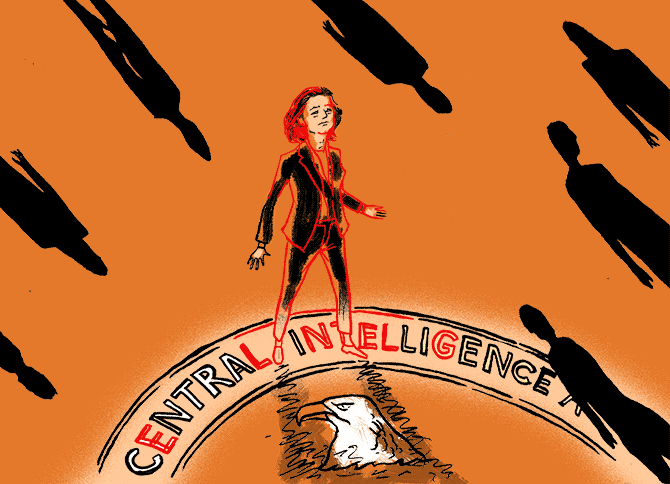Donald Trump's new CIA pick hasn't been greeted with the avalanche of media gush that inevitably follows a woman who becomes the first among her gender to get a top job, says Shuma Raha.
Illustration: Dominic Xavier/Rediff.com

What's your idea of a female spy?
A smouldering double agent?
A ruthless femme fatale as good at seducing men as she is at putting a bullet through them?
Or a chilling tactician, a high priestess of spydom, who presides over lesser spooks and stops at nothing to get the job done?
Well, popular culture just got some fresh grist for its many-splendoured image of the female spy.
US President Donald J Trump announced that his pick for the next CIA director was Gina Haspel, an award-winning intelligence officer who has spent most of her career in undercover operations.
Once the US Senate confirms her nomination, Ms Haspel will become the first woman to head the CIA.
Cause to bring out the brass band and sing hosannas to woman power? Certainly.
Yet, Ms Haspel hasn't been greeted with the avalanche of media gush that inevitably follows a woman who becomes the first among her gender to get a top job.
The reason lies in the CIA director designate's somewhat murky past. After 9/11 she is said to have played a major role in the US' controversial, and much reviled, use of 'enhanced interrogation techniques' of terror suspects.
She ran the CIA's detention site in Thailand where she reportedly supervised the interrogation of high profile suspects by such charming methods as waterboarding -- an extreme torture technique which President Barack Obama later outlawed.
Ms Haspel's alleged exploits conjure up visions of a cold-blooded female spymaster (or should we say spymistress?) who will commit any crime against humanity to secure her objective.
It's a pretty compelling vision: A woman who unleashes unspeakable torture and sundry murders in the service of her country -- a sort of Lady Macbeth of spookery...
One can almost hear the screen writers rolling up their sleeves to bang out a spy yarn with just such a female lead. The audience would eat it up.
In truth, audiences have always devoured the spectacle of the female spy.
Ever since Greta Garbo did her memorable turn as Mata Hari -- the exotic dancer who snooped for the Germans during the First World War -- in a 1931 film of the same name, popular culture has been replete with spies who use their feminine wiles to lethal effect.
Many are double agents because a double-crossing sexy siren fits neatly into the misogynistic idea of a woman as a wicked, untrustworthy, being.
The James Bond films cemented the stereotype of the oomphy spy girl. Whether it was the meltingly beautiful Tatiana Romanova (From Russia With Love), the fiendish Fiona Volpe (Thunderball), Miss Taro (Dr No), Helga Brandt (You Only Live Twice), or the luminous double agent Vesper Lynd (Casino Royale) and many others, female spies, nefarious or not, existed to provide eye candy -- either coming a cropper or falling in love with the womaniser Bond or both.
Again, while a male spymeister could be a donnish George Smiley, the unassuming hero of John Le Carré's spy thrillers, a woman had no such luck.
If she didn't have a hot bod, all she could be was someone like the mannish, cartoonishly evil Rosa Klebb (From Russia With Love), with ugly shoes that sprouted poisoned blades.
Of course, the spy girl narrative has changed considerably since then. Angelina Jolie is an empowering watch as the kick-ass female spy-cum-action hero in movies such as Mr And Mrs Smith and Salt.
In fact, ever since Judi Dench assumed the role of 'M', the head of MI6 and James Bond's boss, in GoldenEye (1995), there has been a marked shift in the balance of power between male and female spies as depicted in the movies.
Inspired by the real life figure of Stella Remington who became the first director general of MI5 in 1992, Ms Dench's M is a steely spymeister who looks motherly but does her job with icy efficiency.
In GoldenEye she ticks off Bond as a 'sexist, misogynist dinosaur' and tells him: 'If you think for one moment I don't have the balls to send a man out to die, your instincts are dead wrong.'
The spy-seductress may still be a thing -- witness Jennifer Lawrence in this year's Red Sparrow -- but clearly, the spy girl as sex object is no longer de rigueur.
In recent years, movies and television have thrown up some fairly complex female spy characters. In the hit US television series Homeland, CIA operative Carrie Mathison is bipolar, unstable and morally ambivalent.
Her decisions send scores of innocent people to their deaths, a fact she has to shrug off as 'collateral damage'.
In the 2012 film Zero Dark Thirty, which charts the hunt for Osama bin Laden, Jessica Chastain plays a CIA counterintelligence officer who unflinchingly participates in violent torture sessions to extract information that might lead her to bin Laden.
Zero Dark Thirty was panned for its portrayal of extreme torture and its apparent moral vacuum.
One wonders if Ms Haspel's appointment as CIA director will spur many more chillingly realistic depictions of the female intelligence officer as a professional who carries out her job, no matter what the human cost.











